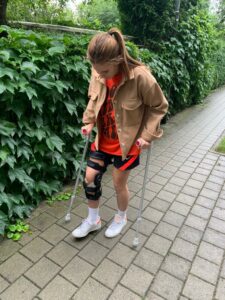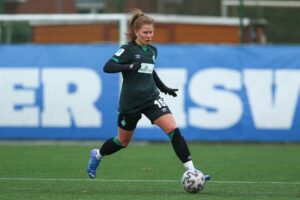“Come back stronger”: Bundesliga player Emilie Bernhardt on her journey with an ACL injury
It could have been a break-through summer for Emilie Bernhardt.
The 20-year-old footballer had made it into the starting XI of Bundesliga club Werder Bremen and had been well on her way to make it to the U20 Women’s World Cup in Costa Rica – something that could have become a career highlight.
During one of the national team’s training sessions Bernhardt fell victim to what currently can only be described as the ‘cancer’ of women’s football. She suffered an ACL injury.
In an interview with the Sports Gazette, Bernhardt talked about her feelings right after the diagnosis, the recovery process, and how the injury could serve as a blessing in disguise.
It all started with a “pop”
“We didn’t have a game. It happened in training during a change of direction,” Bernhardt relived this profound moment of her career.
“In that situation, my first thought was somehow: “S*it, I’ve just torn my ACL”. She immediately recognised the “popping” sound. At that point she already feared the worst…
“At the beginning it was so scary, the World Cup was gone, half of the Bundesliga season was definitely gone, but I also decided, for myself, to see this as an opportunity.”
Tearing the anterior cruciate ligament has become a serious problem in professional women’s football. A high number of players have fallen foul to this injury throughout the last year. Arsenal strikers Beth Mead and Vivianne Miedema recently became the latest additions to the list.
While experts and the media both came to the conclusion that a radical change is needed in how ACL injuries are approached and being researched on, players often have to deal with it on their own.
On the one hand, the physical details are often widely discussed and analysed. On the other hand, people seem to forget about the psychological effect a long term injury can have on footballers.

“The world collapsed at first, because you know what it means.”
Emilie Bernhardt is one of 20 Bundesliga players that are currently out with an injury – one out of nine players with torn ACLs.
Bernhardt did some follow-up reading on the topic after the injury: “If you look at the list of injured players, it feels like half of them are out with ACLs. That is extreme. I feel like these things – football boots and cycle-based training – are just coming more and more. But by being in the situation yourself, you look into it a bit more. It’s often the case that if you haven’t had that kind of contact with it, you’re just not into it.”
At the beginning, the Bremen player felt “actually okay” for the first two days after the diagnosis. “Personally, I didn’t yet realise what that meant for me. That somehow only came with the operation.
Missing out on the U20 Women’s World Cup in Costa Rica was particularly hard.
“I was looking forward to it for the whole season, because we were at the European Championships with the U17s, where we won. We’d never been to the U17 World Cup before. Especially when you’re in the older age group, you have a bit more responsibility.”
She had high expectations for the tournament, especially in terms of getting her name out there: “I think I would have had a very good chance to play an important role. And it’s also a stage to present yourself like that and to compete internationally.”
Even though Bernhardt was not part of the World Cup squad, the DFB (German Football Association) team still thought of her by giving her a jersey as a small consolation.

Torn ACL, what comes after?
Emilie Bernhardt chose to undergo rehab in Bavaria (in the south of Germany, while Bremen is in the north) where she could stay with her family. This turned out as a great way to help her as she was extremely limited after her operation and could only walk on crutches.
The plan for the rehab in the south of Germany came together through her counsellor: “We organised that on our own through the counsellor, with surgery and rehab.”
“You always have the question ‘Why did this happen now?’ You still ask yourself that and of course you don’t get an answer, but with time it becomes a little easier to deal with it.”
The medical situation for many Bundesliga clubs in general is difficult as they don’t have the money to invest in multiple physiotherapists and other medical staff.
Bremen made it to the highest division for the first time in 2015/16. Since then, they have had several ups and downs through the top two German divisions. This has probably affected the investments flowing into the women’s department.
“I have the feeling that a lot of clubs are saving money in the wrong place, and it’s always a pity that something bigger has to happen first before something changes”, the player added.
Bernhardt sees rehab process as opportunity to get back stronger
The 20-year-old watched the games of her team from home. According to Bernhardt this was one of the best decisions she had made for multiple reasons.
“I’m glad that I didn’t watch my team train or play every week. I visited them once when they did some extremely strenuous runs while I was riding my bike. And to see that, that somehow does something to you, because you think to yourself: wow, you’ll never get to that level again.”
Additionally, she got to spend more time with her family and connected with old friends. On top of that, the opportunity arose to reset the focus on her career.
“I somehow saw the whole thing as an opportunity in the long term and knew that if I already have this time for myself, I want to make the most of it”, Bernhardt clarified.
“Of course it’s a chance, because I know that I have a completely different level of strength than before and I know now what I can do and what I have achieved over the months”, she said. “You see it as a chance to show what you have achieved and how much it means to you and how beautiful it actually is.”
At the same time, the Bremen player does not want to put too much pressure on herself when she gets back to the pitch.
“Not everything will run perfectly anyway, that’s quite normal. It’s a process, but you try not to stress yourself out so much about the whole issue, because it also takes a bit of time,” she says.
As a coping mechanism, Bernhardt watched a lot of documentaries about people who had to go through the same process as her.
“There is this saying ‘Come back stronger’ and there is somehow something to it.”
She also spent a lot of time listening to music and watching footage of musicians on how they write songs, what they want to express through them. “I found that very interesting and you can take a lot away for yourself”, Bernhardt describes. “Of course, I also had the distraction of university, which made the time go by quickly.”
One of the main takeaways from the time being injured for her was how much appreciation you suddenly get when you are injured.
“So many people wrote to me after the injury. But on the other hand, it’s also a shame that something like this has to happen before you get so much encouragement. But it was also nice to realise how many people sympathised with you.”
The challenge for the future
Now the focus is only on the future.
“After ups and downs in November and December, I’ve been on a very good path since the beginning of January”, Bernhardt summarised the last months of 2022. As of now, the 20-year-old is back on the pitch “which is of course very unfamiliar and new, but fun and gives you a taste of reality.”
Her goal is to return to the team training sessions in March but first and foremost “look from day to day and try to do the best I can.”
Even though her team are not doing particularly well at the moment sitting on a relegation rank in the Bundesliga, Bernhardt keeps believing in improvements: “My team has become much more stable and stronger than last season, even if it doesn’t look that way now. Our shortcoming is that we don’t score any goals.”
The full focus of Bremen is now to stay in the Bundesliga which started again after the winter break on February 3rd.
And hopefully, Emilie Bernhardt will soon be able to join her team on this mission.
Are ACL injuries in Women’s Football on the rise? – A researcher explains